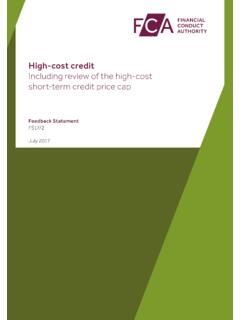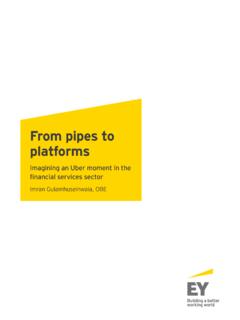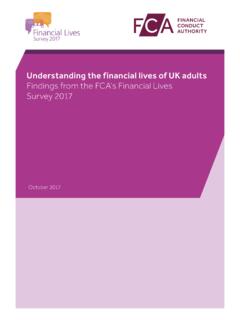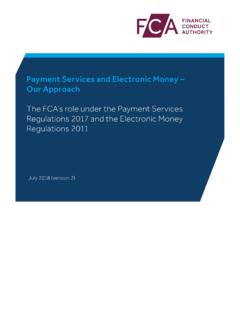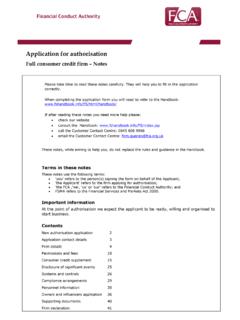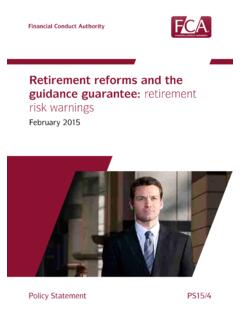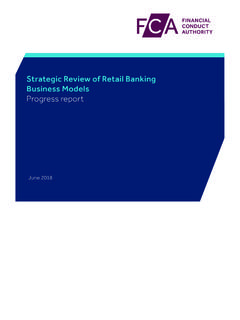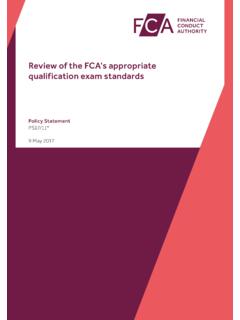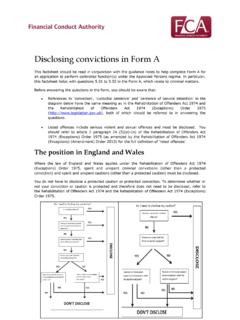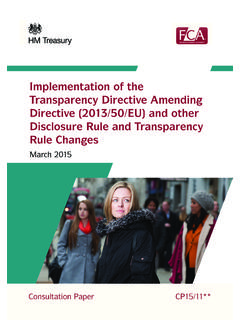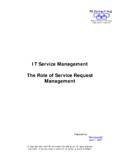Transcription of FCA Business Plan 2018/19
1 Business Plan2018/19 Business PlanContentsChair s foreword 5 Chief Executive s introduction 6 Our priority work for the year ahead 81 Our role 102 EU Withdrawal 163 Our priorities for 2018/19 194 Cross-sector priorities 20 Firms culture and governance 20 financial crime (fraud & scams) and anti-money laundering (AML) 22 Data security, resilience and outsourcing 24 Innovation, big data, technology and competition 26 Treatment of existing customers 28 Long-term savings and pensions and intergenerational differences 30 High-cost credit 325 Sector priorities 34 Wholesale financial markets 34 Investment management 38 Retail lending 41 Pensions and retirement income 44 Retail investments 46 Retail banking 48 General insurance and protection 506 How we operate 53 Annex 1: Update on market-based activity 58 Annex 2: FCA organisational chart 604 Chair s forewordCharles RandellIt is a great privilege to introduce the FCA s Business Plan at the beginning of my time as chair. The plan sets out the range of work we undertake and how it aligns to our objectives.
2 The work we do affects every household and Business in the plan was approved by the FCA board under John Griffith-Jones as chair. He has chaired the FCA for the last five years and I would like to thank him in particular for the commitment to public service and resilience he has brought to his leadership of the year is a challenging one for the regulator. To achieve our priorities, as well as plan for EU Withdrawal, while continuing to deliver our core regulatory activities effectively, will require us to use our resources efficiently and work we do affects every household and Business in the UKI know we will also be looking hard at how we can be an even more accountable and transparent regulator, as we continue to explain to all our stakeholders why and how we make our very much look forward to working with the FCA s staff and its Board in the year ahead. Charles Randell Chair financial Conduct Authority5 financial Conduct AuthorityBusiness Plan 2018/19 Chair s forewordChief Executive s introductionAndrew BaileyThe FCA regulates the UK s financial services sector to ensure that markets work well for individuals, businesses and the UK economy as a whole.
3 This Business Plan explains our priorities over the next publish this Business Plan alongside our Sector Views. Sector Views provide an assessment of the developments, performance and risks of each financial services sector in the previous year. They give us a detailed picture of financial sectors, consumers and relevant macro-economic and demographic factors, which directly informs our activity. The priorities in this year s Business Plan reflect the high level of resource we need to dedicate to EU Withdrawal, given its impact both on our regulation and on the firms we regulate. This inevitably affects the amount of work we can undertake in other areas. As a result, agreeing our 2018/19 priorities has involved particularly rigorous scrutiny and challenge. As we explained in Our Mission, our aim is to use our tools efficiently and cost-effectively to deliver the greatest public value. So we have prioritised areas where we consider both that the risks of harm to consumers, market integrity or competition are greatest and where we assess our intervention will have the most impact.
4 The aim of adding public value cuts across all our activities. This year, as the lease expires on our current location, we move our London office to the International Quarter in Stratford. This will finally allow us to bring all our London staff together in one building. The improved technological infrastructure will allow us to work more effectively and collaboratively, meeting our public interest objectives. Our Mission also stresses the need for us to be able to measure the impact of our work more meaningfully, and we will continue developing better ways to do this over the next 12 months. Planning our priorities for the next year has again underlined how technology is supporting competition, transforming markets and changing the way consumers engage with them. The take-up of technology and innovation across and between firms is accelerating, creating a conveyer belt of risks and opportunities. These are often finely nuanced, so this year we have agreed two clearly defined priority themes to address different aspects of technological regulation, application and resilience.
5 This Business Plan explains why tackling risks including cyber and financial crime, as well as staying ahead of developments in Big Data and Open Banking, remains a Innovate and our regulatory sandbox are increasingly being adopted as templates by many overseas regulators, shaping international standards in innovation. Against this backdrop, the UK s financial Conduct AuthorityBusiness Plan 2018/19 Chief Executive s introduction6 Chief Executive s introductionAndrew Baileywithdrawal from the EU makes it even more important that UK markets remain visibly clean, fair and reliable. It is also important that we both maintain and extend our levels of international requirements of the Markets in financial Instruments Directive (MiFID II) illustrate the major changes to improve market integrity in wholesale markets in recent years. From tackling conflicts of interest to strengthening the transaction reporting and Initial Public Offering (IPO) regimes, we will closely monitor how well firms are complying with these new requirements.
6 To clarify how we take decisions about intervening in markets, this year we will also publish a document which explains our approach to market integrity. This joins documents already published as part of Our Mission, which explain our approach to consumers, competition, authorisation, supervision and culture and governance is pivotal to building public trust and confidence in the UK s financial services industry, both domestically and internationally. We continue to implement the reforms that followed the financial crisis. The extension of the Senior Managers and Certification Regime (SM&CR) to insurers this year will ensure that key staff are accountable for their conduct and decisions. We will publish our policy and final rules that set out how the SM&CR will be extended to all other FSMA firms in summer 2018. Culture and governance is particularly relevant when firms design new products and services . They also heavily influence whether firms Business models deliver the right outcomes for consumers.
7 The shift to consumers having to take more responsibility for their financial choices has coincided with increasingly complex needs. Perhaps nowhere is this more clearly illustrated than in the retirement income savings and pension market. This presents a significant public challenge, both in terms of the need for new and affordable savings products and in the information firms give consumers to help them take decisions. In the past year, we have been extremely concerned about some firms exploiting consumers lack of knowledge of pension products when advising them to transfer out of defined benefit schemes. We have recently published new rules on pension transfer advice. These rules aim to improve the quality of pension transfer advice to help consumers make informed decisions for their individual circumstances. We also published a Consultation Paper (CP) proposing further changes which include requiring pension transfer specialists to have the same qualifications as investment advisers.
8 This CP also seeks views on whether we should intervene in charging structures for pension transfer advice. In 2018 we will be collecting details of practices across the entire pensions transfer market to build a national picture to assess potential and actual harm and identify the most effective ways to reduce it. Over 2018/19 we will deliver a wider package of remedies as part of our Retirement Outcomes Review. These are just some of our priorities over the next 12 months. Delivering our core work of authorisation, supervision, enforcement and developing and implementing policy and rules will always demand most of our this particularly challenging year, I am delighted to welcome Charles Randell as the FCA s new Chair. I would also like to thank our outgoing Chair, John Griffith-Jones and pass on my and the FCA s warmest wishes for his future. Finally, I would like to thank all of our staff. I am consistently impressed with their sheer hard work and commitment to delivering the greatest possible public value to firms, consumers and the UK economy.
9 Andrew Bailey Chief Executive financial Conduct AuthorityThis year s Business Plan priorities reflect the high level of resource we need to dedicate to EU Withdrawal7 financial Conduct AuthorityBusiness Plan 2018/19 Chief Executive s introductionCross-sector priorities:Firms culture and governanceFinancial crime (fraud & scams) & anti-money laundering (AML)Data security, resilience and outsourcingFinalising rules to extend the Senior Managers and Certification Regime to all FSMA firmsEstablishing a public registerFocusing on firms remuneration arrangementsTackling money launderingPublishing our findings on money laundering in the e-money sectorEmbedding the new Office for Professional Body Anti-Money Laundering Supervision (OPBAS)Taking account of the recommendations of the financial Action Task Force s evaluationRaising awareness of fraud and scams Improving intelligence sharing with law enforcement partners and agencies to fight money laundering and financial crimeSupervisory assessment of firms operational resilienceAssessing the risks of outsourcing and third-party providersMonitoring the roll out of technology and resilience data as part of Open Banking and the second Payment services DirectiveEU Withdrawal.
10 Current prioritiesWorking with the GovernmentEnsuring an appropriate transition for EEA firmsWorking with regulated firms and monitoring the risks to our objectivesWorking towards our operational readinessCooperating with our international partnersCross-sector priorities:Innovation, big data, technology and competitionTreatment of existing customersLong-term savings, pensions and intergenerational differencesHigh-cost creditAssisting firms through the FCA Innovate programmeAllowing firms to test viability in the regulatory sandbox Testing and applying RegTech and advanced analytics to regulationReviewing retail banking Business modelsReviewing firms use of data and publishing a Memorandum of Understanding with the Information Commissioner s OfficePublishing new crowdfunding rulesReview of cryptocurrencies as part of the Treasury, Bank of England and FCA TaskforceUnderstanding firms pricing practices in retail general insuranceCommunicating with claims management companies in advance of regulation in 2019 Assessing claims inflation in general insuranceHelping consumers make informed decisions on their insurance needsImproving competition in current accountsPublishing final rules to allow more Small and Medium-Sized Enterprises access to the financial Ombudsman ServiceImproving competition in the cash savings marketDelivering a package of remedies as part of the Retirement Outcomes ReviewCollecting and acting on data from firms that have pension transfer permissions to assess practices across the marketUnderstanding the levels of consumer undersaving for retirementPublishing a feedback statement on competition in non-workplace pensionsConsidering alternatives to high-cost creditFinalising our review of high-cost credit products including.
